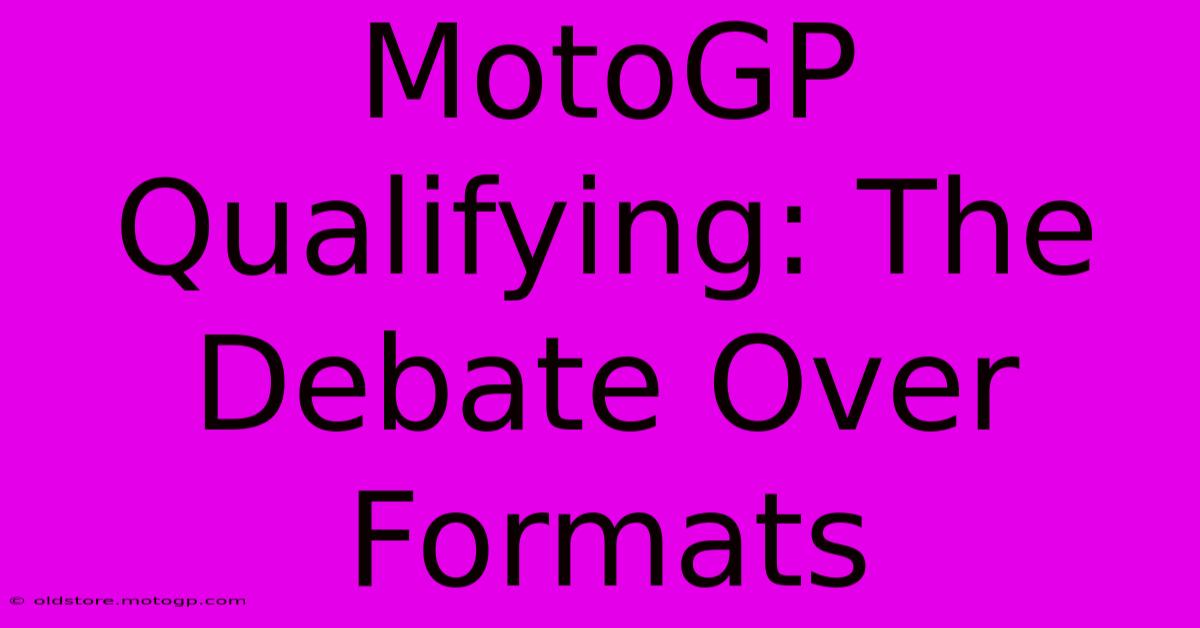MotoGP Qualifying: The Debate Over Formats

Table of Contents
MotoGP Qualifying: The Debate Over Formats
MotoGP qualifying. The nerve-wracking, nail-biting, tire-smoking sprint to secure a prime grid position. But the format of this crucial stage has been a subject of intense debate among fans, riders, and commentators alike. This article dives deep into the evolution of MotoGP qualifying, exploring the various formats used, their strengths and weaknesses, and the ongoing arguments surrounding the best approach.
A History of MotoGP Qualifying Formats
The current qualifying format, while seemingly straightforward, is the product of years of evolution. Let's look back at some of the key changes:
The Early Days: Simple Time Trials
In the early days of MotoGP, qualifying was a straightforward affair. Riders had a limited number of laps to set their fastest time, with the quickest time determining the grid position. This system, while simple, lacked the drama and excitement of modern qualifying. It also often meant that riders who were unlucky with traffic or track conditions could be disadvantaged.
The Introduction of Q1 and Q2: A Two-Tier System
The current two-tiered system, separating riders into Q1 and Q2, was introduced to address some of the shortcomings of the previous format. This system ensures that the fastest riders battle it out in Q2, while those slightly further down the timesheets have a chance to fight for advancement in Q1. This added a layer of intensity and strategy, making qualifying a much more engaging spectacle.
The Sprint Race: A New Contender?
The recent introduction of the Sprint Race has further complicated the qualifying picture. While not strictly part of qualifying itself, the Sprint Race now heavily influences grid position for the main race, adding another dimension to the weekend's events. This has sparked a renewed debate: does the Sprint Race enhance or detract from the importance of qualifying?
The Arguments For and Against Different Formats
The current format, while popular with many, isn't without its critics. Let's delve into the pros and cons:
The Two-Tier System (Q1 & Q2):
Pros:
- Increased excitement: The battle for progression from Q1 creates a thrilling subplot to the main qualifying session.
- Fairer system: It gives riders who might not be consistently at the top a chance to secure a good grid position.
- Clearer separation of top riders: Q2 allows the fastest riders to focus on fighting for pole position without interference from slower riders.
Cons:
- Potential for upsets: A single mistake in Q1 can eliminate a rider from contention for a better grid slot, even if they have the pace.
- Less track time for some: Riders in Q1 have less overall track time compared to those who automatically qualify for Q2.
The Single Qualifying Session:
Pros:
- Simplicity: A straightforward approach with less complexity.
- More track time for all: Every rider gets the same amount of time on track.
Cons:
- Traffic congestion: Slower riders can impede faster riders, leading to unfair results.
- Less excitement: Lacks the intense battle for progression seen in the current two-tier system.
The Sprint Race Impact:
Pros:
- Added excitement to the weekend: The Sprint Race creates an additional race day, increasing fan engagement.
- Better reflection of true pace: The Sprint Race often shows the true racing pace of the riders, offering insights into potential race performance.
Cons:
- Increased risk of damage: The added race means more opportunity for accidents and bike damage.
- Potentially devalues qualifying: The importance of qualifying might be diminished as the Sprint Race heavily influences grid positions.
The Future of MotoGP Qualifying
The debate over the ideal MotoGP qualifying format is far from over. The introduction of the Sprint Race has shifted the balance, and further adjustments may be on the horizon. Factors such as rider safety, fan engagement, and the overall fairness of the system will all play a crucial role in shaping future decisions. Will we see a return to a simpler system, a refinement of the current format, or a completely new approach? Only time will tell. The evolution of MotoGP qualifying continues, and it's a compelling narrative to watch unfold.

Thank you for visiting our website wich cover about MotoGP Qualifying: The Debate Over Formats. We hope the information provided has been useful to you. Feel free to contact us if you have any questions or need further assistance. See you next time and dont miss to bookmark.
Featured Posts
-
Famous Motorcycle Riders And Their Impact On Culture
Feb 18, 2025
-
Tnt Sports Moto Gp Where Passion Meets Performance
Feb 18, 2025
-
The Art Of Moto Gp Racing Mastering Speed And Control
Feb 18, 2025
-
Moto2 Bike Specs A Riders Handbook To Success
Feb 18, 2025
-
Moto Gp Arcade Pure Racing Adrenaline
Feb 18, 2025
